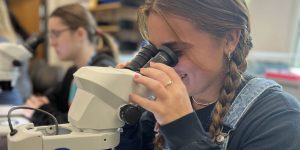How many students are in your Engineering program?
In the fall 2023 semester, we had 49 unique students taking at least one Engineering course.
What is the average class size?
Over the 2022-23 and 2023-24 academic years, the average number of students in classes offered by our Engineering department has been 10.4 students. In addition, the required courses in other departments such as Calculus I & II, first-year Chemistry and first-year Physics rarely have more than 24 students in a class. The average class size college-wide is 17.
Are your graduates able to find engineering jobs?
Yes! Two weeks after graduation, all our May 2023 graduates were either working full-time in an engineering position or had been accepted to graduate school.
Are your students able to work at internships?
Yes. Over the summer of 2023, 75% of our rising juniors and seniors worked at engineering internships or were involved in research experiences for undergraduates (REUs). All of these were paid position with the pay ranging from $15 to $32/hour. Our Levett Career Center assists students in finding internships (include link to the LCC).
Do students earn academic credit for internships?
Students can choose to earn a one-time full course credit if they work at an engineering internship for at least 160 hours and complete a series of assignments such as a weekly journal and a reflective essay at the end of the internship.
Will I need a laptop computer, and, if so, what specifications should it meet?
While we do have several locations on campus with computers anyone can use, you will find having your own laptop to be helpful, and after your first year it will be almost a necessity.
For Engineering classes, we find that a Windows-based laptop is better than a Mac. While a Mac can be configured to run Windows-based programs, it is much easier to just have a Windows machine.
You will need a minimum of 4GB of memory (8GB would be ideal). You should also buy a mouse that has three buttons (the third button is usually just a roller wheel between the left and right buttons). That will make it easier to use CAD programs.
Also, for our preferred CAD program, you should have a monitor that has 1280 x 1024 (or higher) resolution with 24-bit or greater color. Also, the laptop graphics card should be either NVIDIA or AMD based on the chart below.

I want a degree in (fill in the blank) Engineering. Why do you only offer the BS in Engineering?
We believe our multi-disciplinary BS in Engineering degree is best option for an era in which technology is rapidly changing. Most of the jobs today’s engineering students will have during their careers have not been invented yet, and there will be many kinds of engineering that are not offered by any engineering school today. The best way to prepare for the jobs of the future is to have a solid foundation in a breadth of the fundamental concepts of engineering coupled with the broad education offered by Hanover College’s general education curriculum that teaches you how to learn topics that are completely new to you. Then, when the next big thing appears in world of engineering, you will be well-equipped to master it.
Is it still possible to specialize in a particular area of engineering in your program?
Yes. If you pursue our BS in Engineering, only 11 of the 26 courses needed for the degree are required. For the other 15, you can chose to concentrate in subjects that focus on Chemical Engineering, Civil Engineering, Computer Engineering, Electrical Engineering, or Mechanical Engineering, or you could choose a mix of those areas for your degree.
What is the difference between your BS in Engineering and your BA in Engineering Science?
The simple answer is ten classes! Our BS requires a total of 26 classes while the BA requires only 16. The latter gives you the flexibility to pursue a second major or a minor in another field of interest. Also, the ten courses that are required for the BA are also required for the BS, so you do not have to decide right away whether you are going to pursue one or the other degree. You start by working on the required courses such as Physics, Chemistry and Calculus, and in the second semester of your sophomore year, you will be asked to decide which degree you wish to pursue. It should be noted that only our BS meets the ABET accreditation standard.
What is ABET accreditation?
ABET is the recognized accreditation agency for college engineering programs in the U.S. and around the world. In order to be accredited by ABET, an engineering degree must meet ABET’s rigorous requirements for curriculum, faculty, and facilities. The program must also have a continuous improvement process in place that ensures graduates will attain the seven “student outcomes” ABET requires. More information on ABET can be found at its website: www.abet.org




